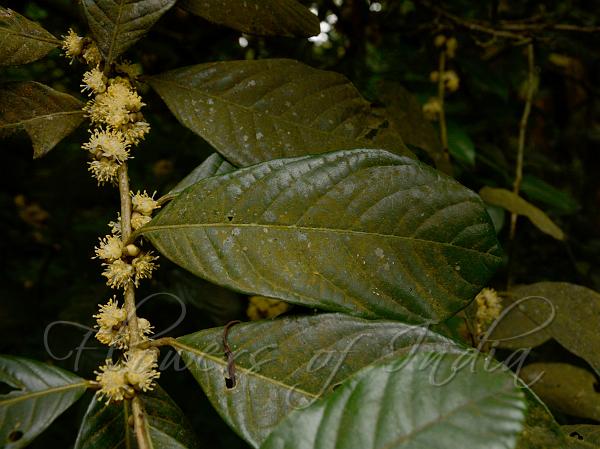|
| Malabar Litsea |
|

|

| File size | 700841 |
| Original date | 12/17/17 10:30 AM |
| Resolution | 0 x 0 |
| Flash | Flash did not fire, auto |
| Focal length | 28.0mm |
| Exposure time | 1/100s |
| Aperture | 5.6 |
| Focus Distance | |
| Metering Mode | Center weighted average |
| Camera make | NIKON CORPORATION |
| Camera model | NIKON D7100 |
| Sensor type | OneChipColorArea |
|
|
|
|
Photo: |
Botanical name: Litsea bourdillonii Family: Lauraceae (Laurel family)
Malabar Litsea is a large tree, up to 8 m tall,
branchlets brownish-black woolly. It is named for the naturalist Thomas
Fulton Bourdillon. Leaves are simple, alternate, estipulate; leaf-stalk
1.0-1.7 cm long, stout, dark-brown woolly; blade 15-21 x 6-12 cm,
obovate or obovate-oblong, base wedge-shaped or pointed, tip bluntly
pointed; margin entire, hairless above except midrib, fulvous
velvet-hairy, dotted and glaucous beneath, leathery; lateral nerves
12-18 pairs, pinnate, prominent beneath, more or less close,
intercostae scalariform, prominent. Flowers are unisexual, in umbellule
which may be stalkless or nearly so, in clusters of 2-5, in leaf-axils
or lateral. Flowers are 4-6 in an umbellule; bracts 4, 5 mm long,
round, concave, densely white-woolly; perianth tube short, lobes 6,
densely white-woolly, stamens 12, in 4 rows; filaments hairless, those
of rows 1 and 2 usually eglandular, those of rows 3 and row 4 with
2-glands; anthers 4-celled, introrse; staminodes in female flowers as
the stamens of males but those of the outer rows club-shaped or linear,
those of the inner rows subulate and 2-glandular; ovary half inferior,
ovoid; style thick; stigma dilated. Fruit is a berry, 1.0-1.2 cm long,
oblong, seated on a cup-shaped perianth tube. Malabar Litsea is
endemic to the Western Ghats, Kerala, Karnataka, Tamil Nadu.
Flowering: August-March.
| Identification credit: Siddarth Machado | Photographed in the Anamalais, Tamil Nadu. |
• Is this flower misidentified? If yes,